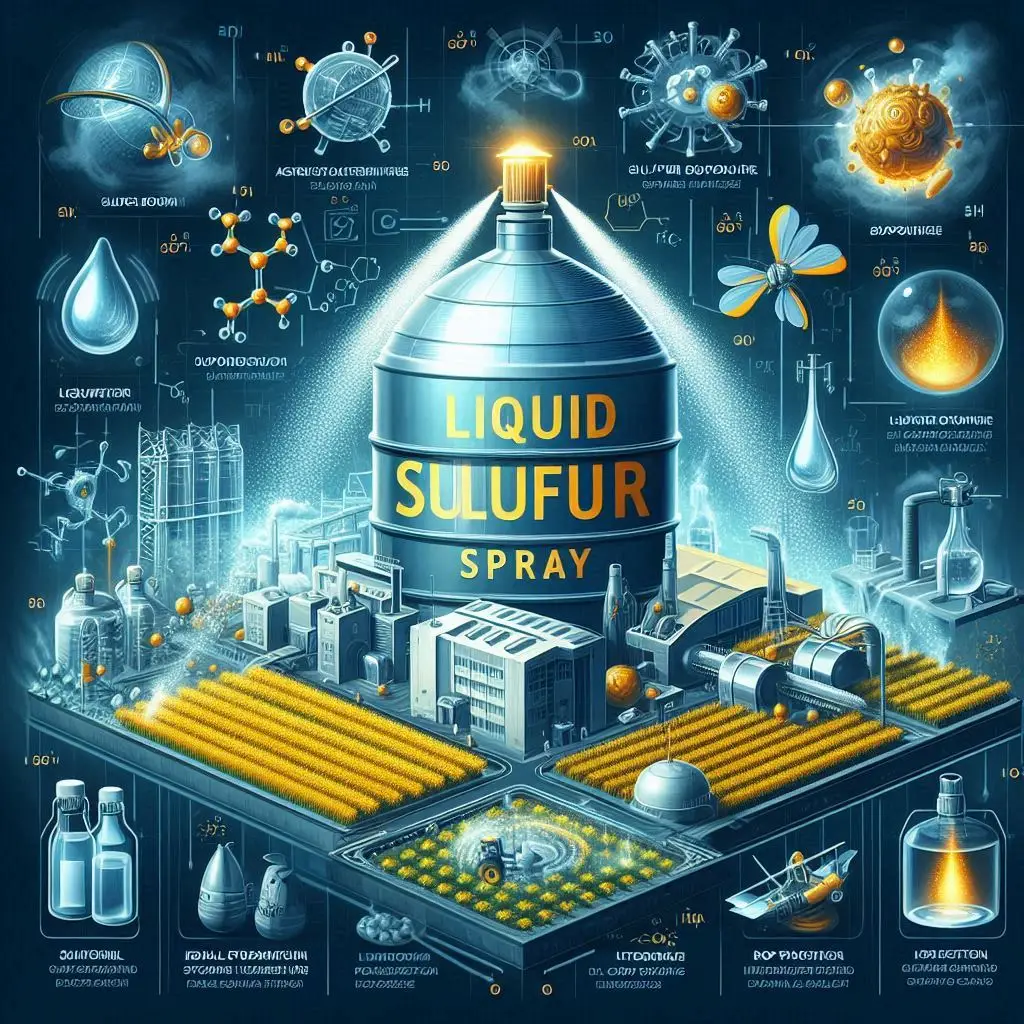
Liquid Sulphur Spray: Formula, Uses, Temperature & Dioxide Applications
Short Intro:
Liquid sulphur spray plays a crucial role in modern agriculture and industry, from crop protection to sulphur dioxide applications. This guide explores its formula, uses, handling temperature, and benefits in depth.
Introduction
Liquid sulphur spray has become an essential component in agriculture and industry due to its wide range of applications. In farming, it serves as both a nutrient source and a fungicide, helping plants fight diseases and correct sulfur deficiencies. In industrial sectors, sulphur dioxide derived from liquid sulphur supports processes like water treatment, winemaking, bleaching, and sulphuric acid production. Understanding the formula, uses, temperature considerations, and industrial significance of sulphur dioxide helps ensure safe, efficient, and sustainable applications.
SEO Snippet
👉 Looking for a complete guide to liquid sulphur spray formula, uses, temperature control, and sulphur dioxide applications? Learn how it supports agriculture, soil health, disease control, and industry.
Liquid Sulphur Spray
Liquid sulphur spray, also called sulfur foliar spray or liquid sulfur fungicide, is a vital agricultural tool. Its primary role is controlling fungal infections such as powdery mildew, rust, and foliar diseases while also serving as a sulfur supplement. Plants absorb the nutrient quickly, leading to better chlorophyll formation, enzyme activation, and protein synthesis.
Key benefits include:
- Fungal control: Effective against common crop diseases.
- Nutrient supply: Corrects sulfur deficiencies quickly.
- Compatibility: Can be tank-mixed with fertilizers, insecticides, or adjuvants.
- Integrated pest management (IPM): Enhances disease resistance naturally.
Proper dosage, timing, and environmental conditions such as humidity and temperature are crucial for achieving the best results.
Liquid Sulphur Formula
The liquid sulphur formula is engineered to deliver sulfur efficiently. It contains:
- Elemental sulfur: Finely ground for maximum reactivity and absorption.
- Surfactants & additives: Prevent settling and improve adhesion to leaves.
- Compatibility agents: Ensure stability when mixed with other inputs.
Application methods include foliar spraying or soil drenching. Dosage depends on crop type and soil sulfur status, determined through soil testing or leaf tissue analysis. Proper formulation ensures stability, usability, and maximum crop benefit.
Liquid Sulphur Uses
Liquid sulphur is highly versatile and supports both nutritional and protective roles in agriculture:
- Fungicide: Prevents fungal outbreaks by forming a protective layer on leaves.
- Nutrient supplement: Boosts photosynthesis and crop productivity.
- Soil amendment: Adjusts pH in alkaline soils, improving nutrient availability.
- Organic farming: Accepted in organic certification programs due to natural origin.
- Integrated pest management (IPM): Indirectly reduces pest pressure by improving plant health.
This versatility makes liquid sulphur a cornerstone of sustainable farming practices.
Liquid Sulphur Temperature
Temperature management is critical for storage, handling, and application of liquid sulphur.
- Melting point: ~115°C (239°F).
- Boiling point: ~444°C (831°F).
- Storage range: 20°C–30°C (68°F–86°F).
Excessive cold can cause solidification and blockages, while overheating may release toxic sulphur dioxide vapors. In field use, temperature also influences fungicidal efficiency—warmer conditions often improve sulfur dispersion and action against pathogens.
Safe handling, insulated containers, and compliance with manufacturer guidelines are essential.
Liquid Sulphur Dioxide
Liquid sulphur dioxide (SO₂) is a dense, colorless liquid with significant industrial applications.
- Properties:
- Melting point: -72°C (-98°F).
- Boiling point: -10°C (14°F).
- Strong reducing agent and solvent.
- Industrial Uses:
- Water treatment: Removes impurities and controls microbial growth.
- Food & wine industry: Preservative and anti-oxidant agent.
- Paper bleaching: Brightens pulp.
- Sulphuric acid production: Key intermediate in the chemical industry.
- Refrigeration: Historical use as a refrigerant.
Because of its toxicity, sulphur dioxide must be handled under strict safety protocols to prevent accidents.
LSI Keywords
- Sulphur spray for crops
- Liquid sulfur fungicide
- Sulfur dioxide applications
- Sulphur fertilizer formula
- Sulphur storage temperature
- Foliar spray sulfur benefits
- Sulphur for organic farming
- Sulphur in wine preservation
External Links
- FAO – Sulphur in Agriculture
- US EPA – Sulfur Dioxide Information
- ScienceDirect – Sulphur Uses in Agriculture
Conclusion
Liquid sulphur is a multifunctional agricultural and industrial input. As a spray, it protects plants from fungal diseases and ensures sufficient sulfur nutrition. As an industrial chemical, sulphur dioxide plays an important role in water treatment, wine preservation, paper bleaching, and sulphuric acid production. Safe handling and correct application, especially in terms of temperature control, are essential for maximizing benefits while reducing risks. By combining scientific formulation, proper storage, and expert guidance, liquid sulphur continues to support both sustainable agriculture and critical industries.
🌍 About Novin Trades
Novin Trades is a trusted global supplier of sulphur, oil derivatives, fertilizers, and industrial chemicals. With expertise in sourcing and logistics, Novin Trades ensures reliable delivery and quality products tailored to agricultural and industrial needs.
📌 Learn more and read our latest industry reportages: Novin Trades Reportages
📌 Join our official channel for updates: Telegram – Novin Trades
Whether you are looking for liquid sulphur spray, sulphur dioxide, fertilizers, or petroleum-based products, Novin Trades is your trusted partner for quality, efficiency, and sustainable trade solutions.

